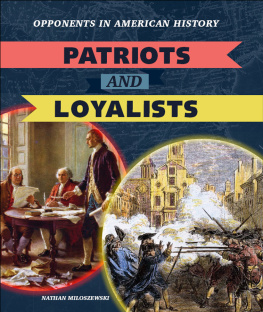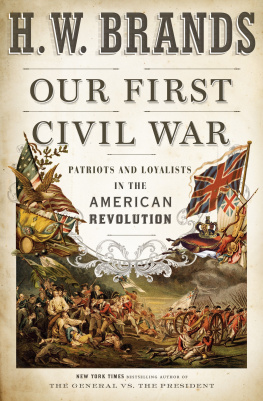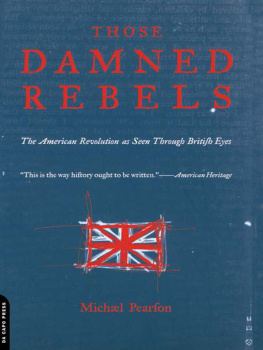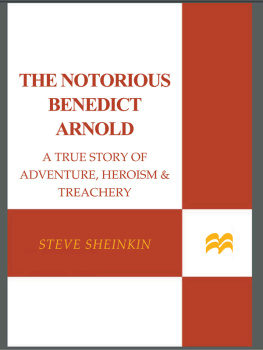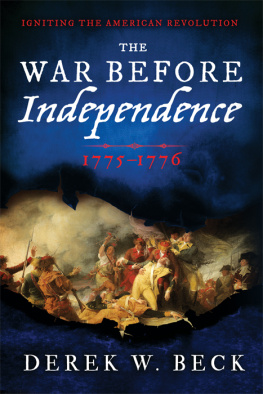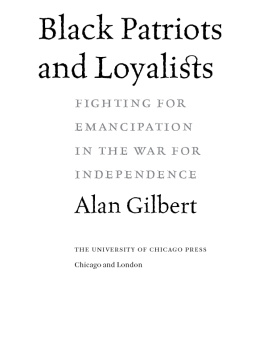Bill Offutt - Patriots, Loyalists, and Revolution in New York City, 1775–1776
Here you can read online Bill Offutt - Patriots, Loyalists, and Revolution in New York City, 1775–1776 full text of the book (entire story) in english for free. Download pdf and epub, get meaning, cover and reviews about this ebook. year: 2022, publisher: The University of North Carolina Press, genre: Politics. Description of the work, (preface) as well as reviews are available. Best literature library LitArk.com created for fans of good reading and offers a wide selection of genres:
Romance novel
Science fiction
Adventure
Detective
Science
History
Home and family
Prose
Art
Politics
Computer
Non-fiction
Religion
Business
Children
Humor
Choose a favorite category and find really read worthwhile books. Enjoy immersion in the world of imagination, feel the emotions of the characters or learn something new for yourself, make an fascinating discovery.

- Book:Patriots, Loyalists, and Revolution in New York City, 1775–1776
- Author:
- Publisher:The University of North Carolina Press
- Genre:
- Year:2022
- Rating:5 / 5
- Favourites:Add to favourites
- Your mark:
- 100
- 1
- 2
- 3
- 4
- 5
Patriots, Loyalists, and Revolution in New York City, 1775–1776: summary, description and annotation
We offer to read an annotation, description, summary or preface (depends on what the author of the book "Patriots, Loyalists, and Revolution in New York City, 1775–1776" wrote himself). If you haven't found the necessary information about the book — write in the comments, we will try to find it.
Bill Offutt: author's other books
Who wrote Patriots, Loyalists, and Revolution in New York City, 1775–1776? Find out the surname, the name of the author of the book and a list of all author's works by series.
Patriots, Loyalists, and Revolution in New York City, 1775–1776 — read online for free the complete book (whole text) full work
Below is the text of the book, divided by pages. System saving the place of the last page read, allows you to conveniently read the book "Patriots, Loyalists, and Revolution in New York City, 1775–1776" online for free, without having to search again every time where you left off. Put a bookmark, and you can go to the page where you finished reading at any time.
Font size:
Interval:
Bookmark:
PATRIOTS, LOYALISTS, AND REVOLUTION IN NEW YORK CITY, 17751776
REACTING TO THE PAST is an award-winning series of immersive role-playing games that actively engage students in their own learning. Students assume the roles of historical characters and practice critical thinking, primary source analysis, and argument, both written and spoken. Reacting games are flexible enough to be used across the curriculum, from first-year general education classes and discussion sections of lecture classes to capstone experiences, intersession courses, and honors programs.
Reacting to the Past was originally developed under the auspices of Barnard College and is sustained by the Reacting Consortium of colleges and universities. The Consortium hosts a regular series of conferences and events to support faculty and administrators.
Note to instructors: Before beginning the game you must download the Gamemasters Materials, including an instructors guide containing a detailed schedule of class sessions, role sheets for students, and handouts.
To download this essential resource, visit https://reactingconsortium.org/games, click on the page for this title, then click Instructors Guide.
SECOND EDITION
Bill Offutt

The University of North Carolina Press
Chapel Hill
2022 The University of North Carolina Press
All rights reserved
The University of North Carolina Press has been a member of the
Green Press Initiative since 2003.
Cover illustration: Johannes Adam Simon Oertel, Pulling Down the
Statue of King George III, N.Y.C., ca. 1852. Wikimedia Commons.
ISBN 978-1-4696-7067-6 (pbk.: alk. paper)
ISBN 978-1-4696-7235-9 (e-book)
BILL OFFUTT is Professor of History and Faculty Advisor for the Pforzheimer Honors College at Pace University. He received his AB from Stanford University and his J.D. from Stanford Law School. Abandoning the law, he then went to graduate school and earned a Ph.D. in Early American History at Johns Hopkins University under Professor Jack P. Greene. His first book, Of Good Laws and Good Men: Law and Society in the Delaware Valley 16801710, was published by Illinois University Press. His academic interests focus on the relationship between law and society, particularly the methods by which legal systems obtain and keep their legitimacy. He has taught classes on colonial America, revolutionary America, the Civil War, Constitutional history, and American womens history. In addition to his own Reacting game, he has taught eight other Reacting games to students at Pace, and he has participated in numerous Reacting conferences as gamemaster and/or player.
PATRIOTS, LOYALISTS, AND REVOLUTION IN NEW YORK CITY, 17751776
It is April 1, 1775. The residents of the British colony of New York are involved in a political and social struggle of enormous intensity, in which the future of millions of people on a continental scale seems contingent on the actions and reactions of every member of that society. For ten years, the actions of the British government (levying taxes, instituting regulations, sending in military troops) have led to many colonial responses of defiance, which have produced repeated political crises and escalating confrontations involving violence and intimidation. The legitimacy of the existing political and economic system of the British empire is now under attack, following Bostons infamous tea party of 1773, the stunning punishments the British government leveled on Massachusetts in response, and the subsequent intercolonial economic retaliation against the British proposed by the first ever Continental Congress in 1774. The British North American colonies now teeter on the brink of political chaos, economic catastrophe, social upheaval, and possibly warincomprehensible possibilities just a few years before.
The vast majority of New Yorkers, formerly lacking much political enthusiasm or principles beyond self-interest, now face a choice of two factions within a political elite that happily prospered from and cooperated with British rule. The Patriots are now passionately opposed to the existing British government, believing that the British have spent the previous decade plotting to destroy colonial rights and liberties. The Loyalists are just as passionately committed to the British governments defense, claiming it ensures the rule of law and provides prosperity, protection, and justice amid chaos and disorder. Many if not most New Yorkers are waiting for the next crisis before picking a side. Those New Yorkersmoderate undecided elite and disfranchised men, women, and slaveswill be swayed to the Patriot or Loyalist side by a combination of principle, self-interest, and opportunistic desire to join the side whose success is most assured.
When the game begins, you have just been calledeither by election or by personal interestto attend a Provincial Congress for the entire New York colony held in New York City Hall. New Yorks regular colonial assembly has been dissolved by the royal governor, who then fled the scene in fear for his safety. The Provincial Congress thus is not a regular governing body but an extraordinary new institution, erected to meet the needs of an ongoing crisis of political power and authority. This Congress must deal with the collapse of the existing order and government under the pressure of events in Massachusetts and the divisions between Patriots and Loyalists in the elite. Without the power to command any regular institutions of governmentpower enjoyed by tax collectors, bureaucrats, or an armythe Provincial Congress will have to enforce its own decisions about New Yorks role in the British Empire, about the necessity of revolution, and about who should make these decisions for society in the first place.
Some of the players in this episode of Reacting to the Past have the power to vote in this Congress, having been elected by their neighbors; some are from the city, others are from nearby counties, and still others are from regions more than one hundred miles away. Other players, including laborers, slaves, and women, sit in the gallery of the Congress without votes, but they are hardly spectatorsthey make comments and ask questions from the balcony or at the podium, add petitions to the agenda, and engage in street actions to influence the course of events. All will draw on their knowledge of history, on the writings of great philosophers and lowly pamphleteers, and on their own personal views on culture, economy, and society to advance their own interests as well as the interests of New York.
Now, in early April 1775, no one knows there will be a war; no one knows that a Declaration of Independence will be produced; and no one knows who will be victorious. The game asks you to determine the fate of New York in 177576, and the outcome depends on your collective actions and choices during the sixteen months of historical time covered by the game. The choices made in the game may (and in fact often do) deviate from what really happened, but all choices available in the game were real possibilities at the time. The game requires you to understand and internalize the choices and contingencies of that time; it allows you to feel the anxieties and triumphs of those alive in that moment, and thus make the history of Patriots, Loyalists, and all colonial Americans your own. You probably know something about the results of the American Revolution, including that the Revolutionary War led to the founding of the United States of America. What the game asks you to do is to forget that outcome, as best you can, and to immerse yourself in the chaotic world of colonial America in 1775. You will not reenact the history of that timeyou will make it.
Font size:
Interval:
Bookmark:
Similar books «Patriots, Loyalists, and Revolution in New York City, 1775–1776»
Look at similar books to Patriots, Loyalists, and Revolution in New York City, 1775–1776. We have selected literature similar in name and meaning in the hope of providing readers with more options to find new, interesting, not yet read works.
Discussion, reviews of the book Patriots, Loyalists, and Revolution in New York City, 1775–1776 and just readers' own opinions. Leave your comments, write what you think about the work, its meaning or the main characters. Specify what exactly you liked and what you didn't like, and why you think so.

